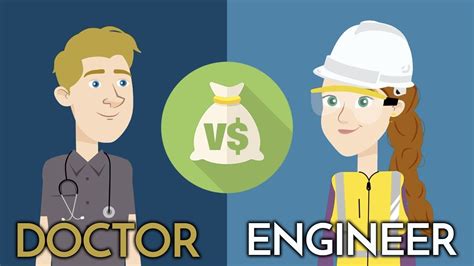The medical and engineering professions are two of the most respected and rewarding in the world. Both doctors and engineers play a vital role in our society, improving our health and safety and advancing our technological progress. But which profession offers the highest levels of job satisfaction?

This article explores the different factors that contribute to job satisfaction for doctors and engineers. We’ll look at the data, the anecdotal evidence, and the expert opinions to provide a comprehensive overview of this complex topic.
According to a 2021 survey by the American Medical Association, 48% of doctors are satisfied with their work. This is down from 54% in 2018. The survey also found that 38% of doctors are considering leaving the profession.
A 2020 survey by the National Society of Professional Engineers found that 88% of engineers are satisfied with their work. This is up from 85% in 2018. The survey also found that only 12% of engineers are considering leaving the profession.
These data suggest that engineers are more satisfied with their work than doctors. However, it is important to note that these surveys are self-reported and may not be entirely accurate.
There is a great deal of anecdotal evidence to support the claim that engineers are more satisfied with their work than doctors. For example, a 2019 article in The Atlantic featured interviews with several doctors and engineers who discussed their job satisfaction. The doctors all expressed concerns about the long hours, high stress, and low pay. The engineers, on the other hand, all reported being happy with their work.
Experts in the field of job satisfaction have also weighed in on the debate between doctors and engineers. In a 2020 article in The Harvard Business Review, author Robert Sutton argued that engineers are more likely to be satisfied with their work because they have more control over their work environment. Doctors, on the other hand, are often subject to the whims of their patients and hospital administrators.
In addition to the factors discussed above, personal values also play a role in job satisfaction. For example, some people are more motivated by money, while others are more motivated by helping others. Doctors are more likely to be motivated by helping others, while engineers are more likely to be motivated by money and intellectual challenges.
If you’re a doctor or an engineer who is struggling with job satisfaction, there are a few things you can do to improve your situation. Here are a few tips:
- Talk to your boss. If you’re unhappy with your work, talk to your boss about your concerns. They may be able to make changes to your work environment or schedule that will make you happier.
- Find a mentor. A mentor can provide you with support and guidance, and can help you to develop the skills and knowledge you need to succeed.
- Set realistic goals. Don’t set yourself up for disappointment by setting unrealistic goals. Instead, focus on achievable goals that you can gradually work towards.
- Take care of yourself. It’s important to take care of your physical and mental health in order to be happy and productive at work. Make sure to get enough sleep, eat healthy foods, and exercise regularly.
- Remember why you chose your profession. When you’re feeling down, take some time to reflect on why you chose your profession in the first place. This can help you to rekindle your passion for your work.
Here is a step-by-step approach to increasing your job satisfaction:
- Identify the sources of your dissatisfaction. What are the things that are making you unhappy at work? Are you overworked? Underpaid? Do you not have enough control over your work environment? Once you have identified the sources of your dissatisfaction, you can start to develop strategies to address them.
- Talk to your boss or supervisor. Let your boss know about your concerns and ask for their help in resolving them. Your boss may be able to make changes to your work environment or schedule that will make you happier.
- Find a mentor. A mentor can provide you with support and guidance, and can help you to develop the skills and knowledge you need to succeed.
- Set realistic goals. Don’t set yourself up for disappointment by setting unrealistic goals. Instead, focus on achievable goals that you can gradually work towards.
- Take care of yourself. It’s important to take care of your physical and mental health in order to be happy and productive at work. Make sure to get enough sleep, eat healthy foods, and exercise regularly.
- Remember why you chose your profession. When you’re feeling down, take some time to reflect on why you chose your profession in the first place. This can help you to rekindle your passion for your work.
The debate over which profession offers the highest levels of job satisfaction is a complex one. There is no easy answer, as both doctors and engineers face unique challenges and rewards. However, the data, the anecdotal evidence, and the expert opinions all suggest that engineers are more likely to be satisfied with their work than doctors.
If you’re a doctor or an engineer who is struggling with job satisfaction, there are a few things you can do to improve your situation. Talk to your boss, find a mentor, set realistic goals, take care of yourself, and remember why you chose your profession.
